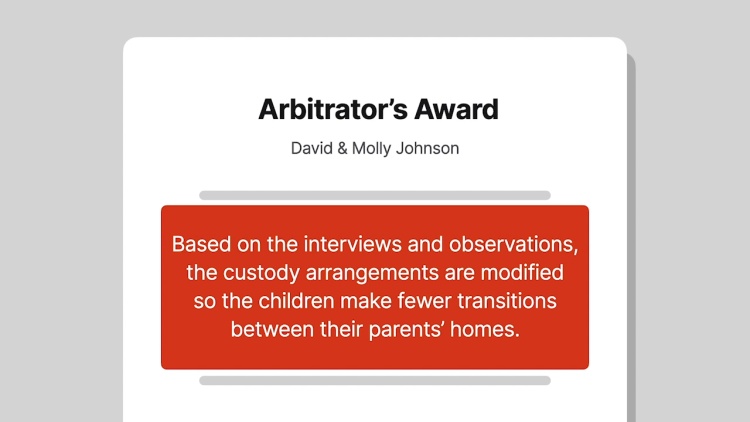Johnson v. Johnson
New Jersey Supreme Court
9 A.3d 1003 (2010)
- Written by Mary Pfotenhauer, JD
Facts
David Johnson (defendant) and Molly Johnson (plaintiff) were divorced with two children. A divorce decree was entered, awarding joint legal custody of the children to David and Molly. David and Molly struggled with scheduling physical custody of the children. As a result, David and Molly agreed to resolve the scheduling issues via arbitration. David and Molly signed a thorough agreement, generally detailing what they expected of the arbitrator’s decision and the arbitration process. The agreement stated that there would be no formal transcript of the arbitration proceedings and that the arbitrator’s detailed decision called for in the agreement would constitute the entire record of the proceedings. During the proceedings, the arbitrator produced a detailed recapitulation of each interview and observation and issued a full and detailed decision in accordance with all procedures agreed upon by the Johnsons. However, Molly disagreed with the decision and filed a petition to have the arbitrator removed. The trial court upheld the arbitrator’s decision. The appellate court reversed, finding that because the arbitrator had not kept a verbatim transcript of testimony, there was insufficient evidence on which the court could review the decision. As a result, the appellate court remanded the case for a plenary hearing. David appealed.
Rule of Law
Issue
Holding and Reasoning (Long, J.)
What to do next…
Here's why 907,000 law students have relied on our case briefs:
- Written by law professors and practitioners, not other law students. 47,100 briefs, keyed to 996 casebooks. Top-notch customer support.
- The right amount of information, includes the facts, issues, rule of law, holding and reasoning, and any concurrences and dissents.
- Access in your classes, works on your mobile and tablet. Massive library of related video lessons and high quality multiple-choice questions.
- Easy to use, uniform format for every case brief. Written in plain English, not in legalese. Our briefs summarize and simplify; they don’t just repeat the court’s language.





